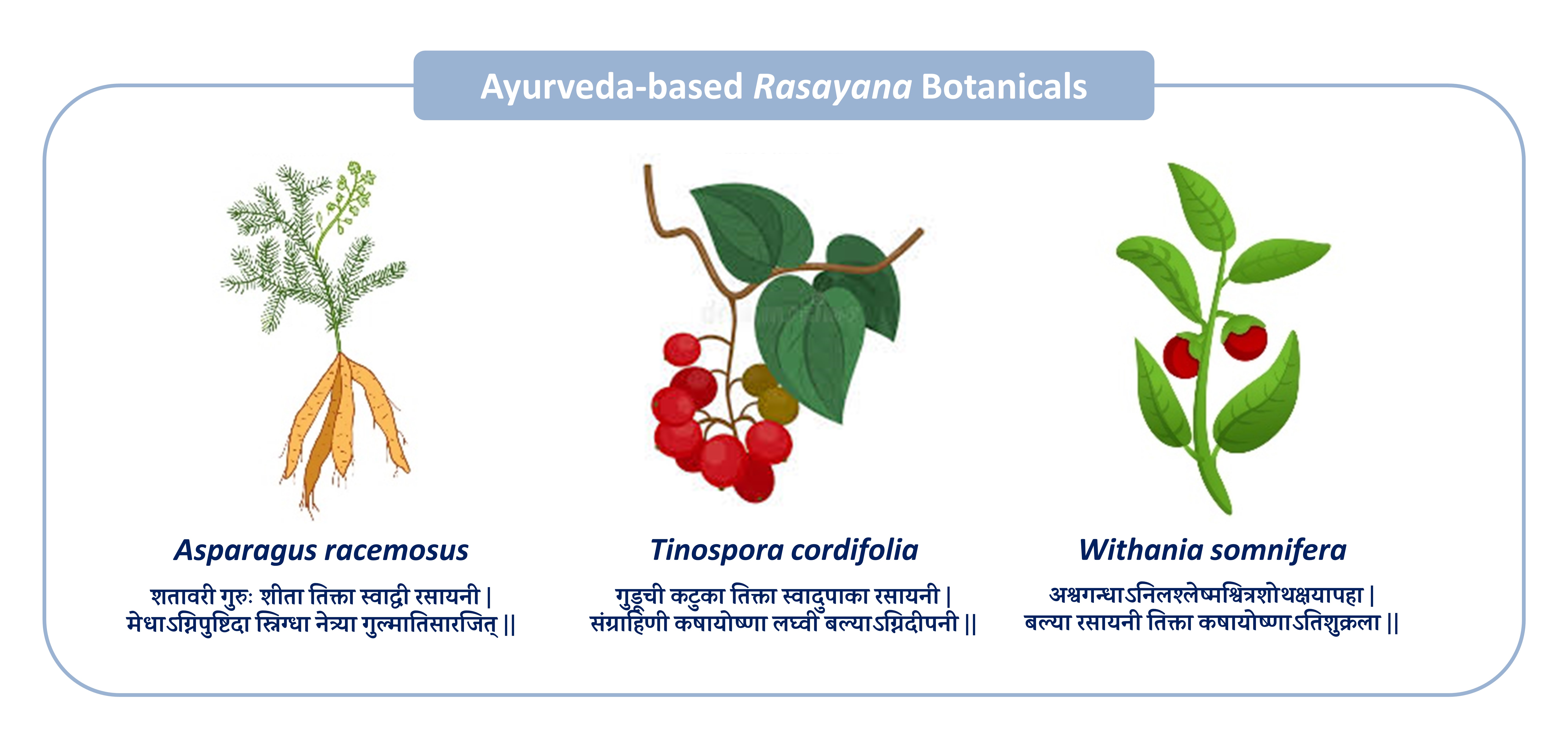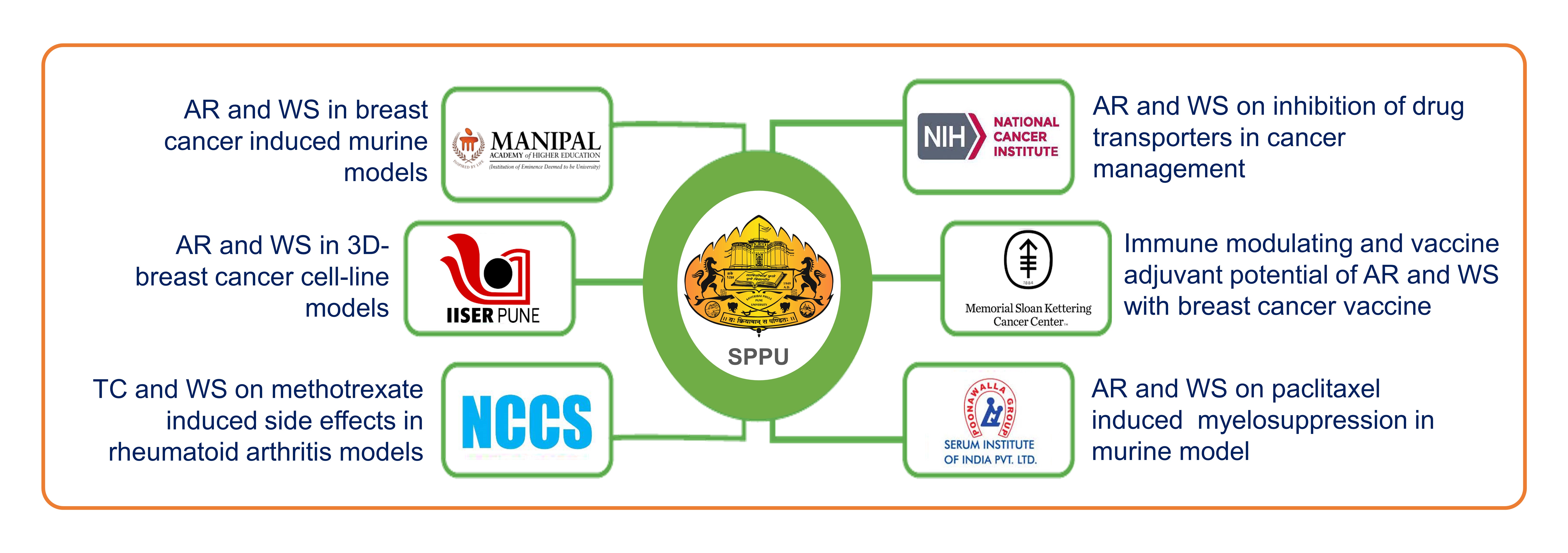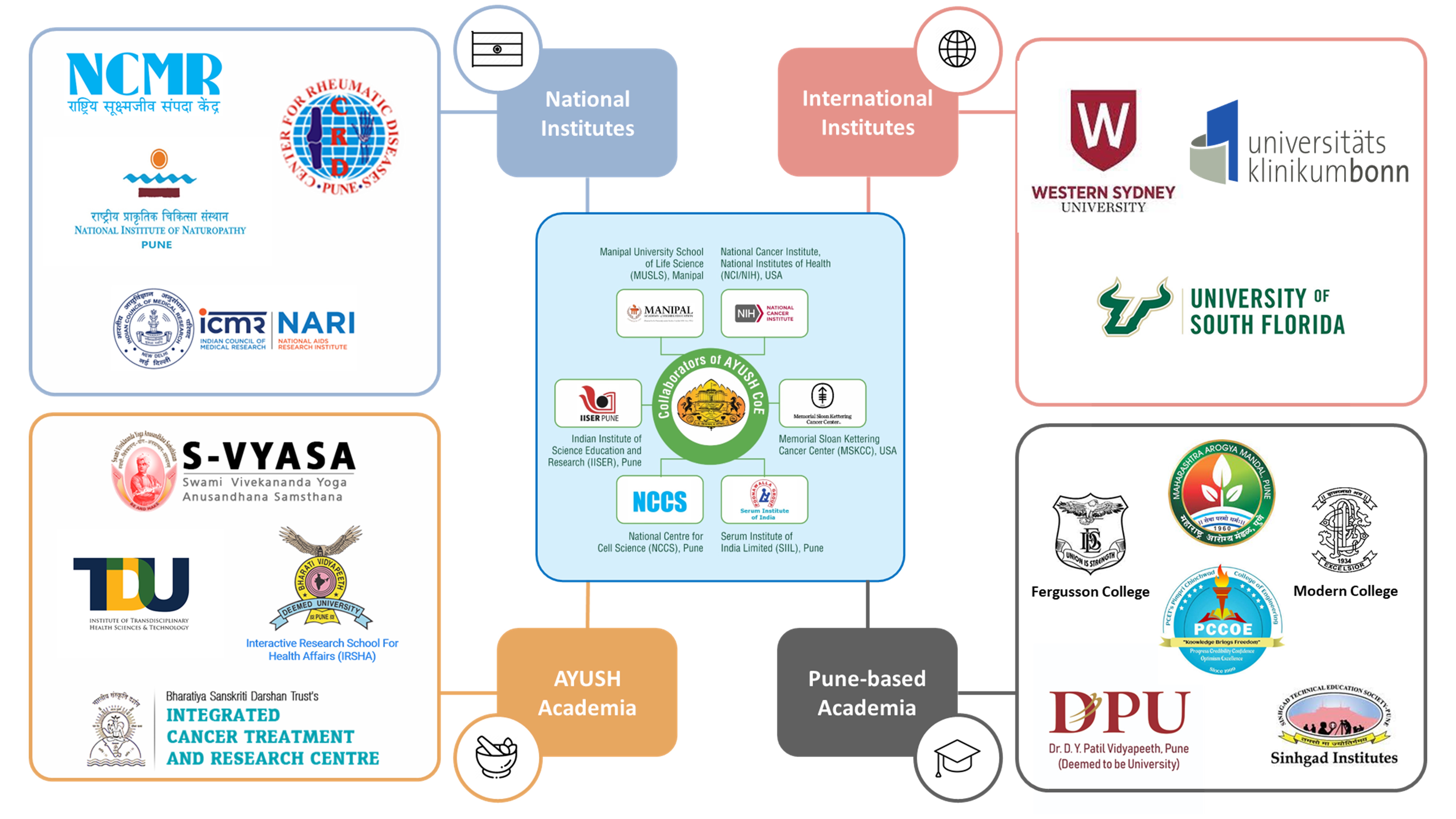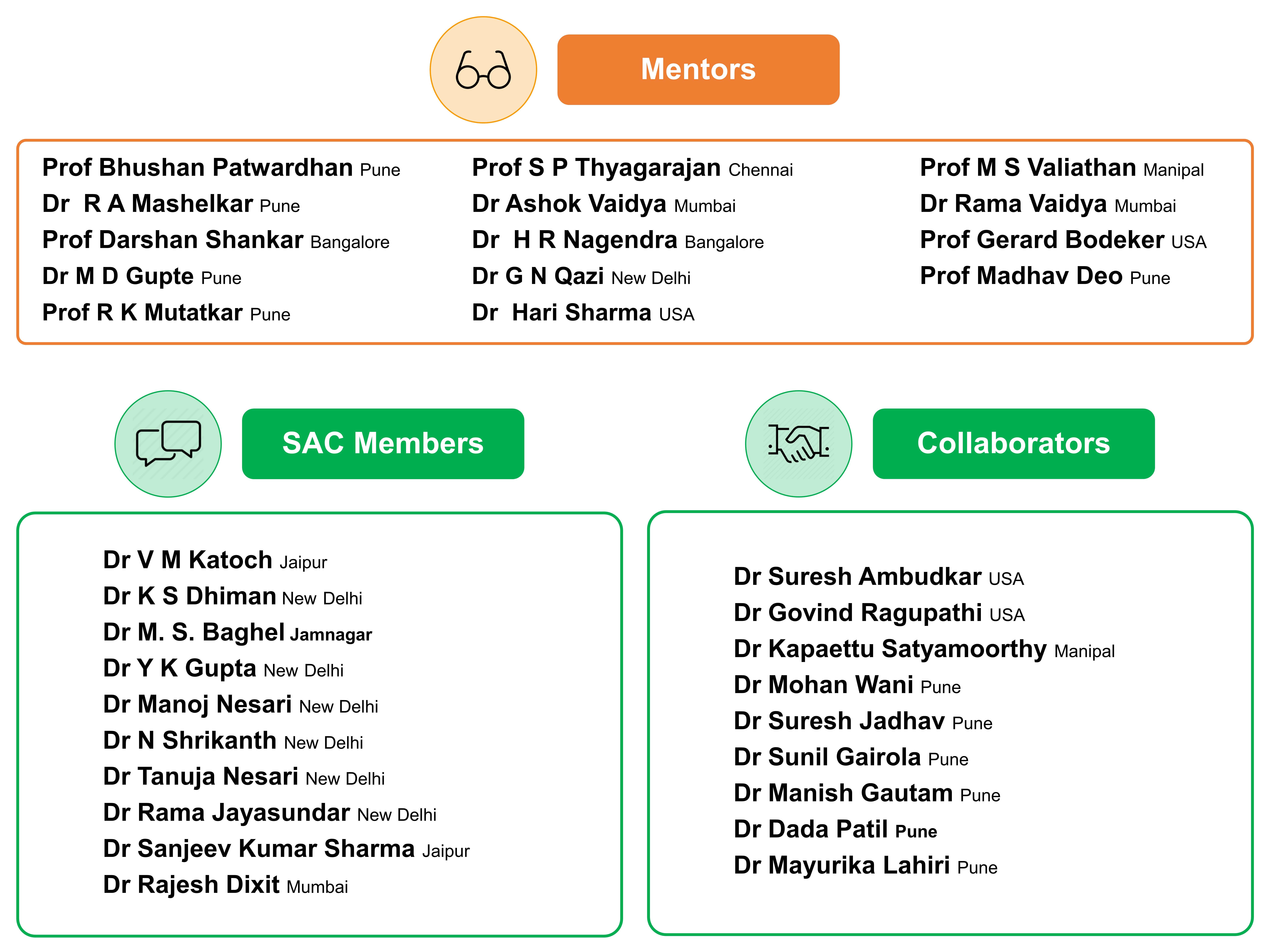AYUSH Center of Excellence

The Ministry of Ayush (MoA), Government of India awarded Center of Excellence (CoE) status to the School of Health Sciences, Savitribai Phule Pune University by recognizing the innovative research and academic work carried out at Center for Complementary and Integrative Health. The MoA sanctioned a grant of more than 3 crs. for a three-year period. The objectives of this AYUSH CoE include building collaborative research network of premium institutes from India and abroad for strengthening interdisciplinary research in AYUSH, demonstrating value of AYUSH and interdisciplinary approaches in management of non-communicable diseases, facilitating human resource development, trans-disciplinary research and capacity building through training, credit courses and fellowship programs for AYUSH sector, and developing strategies based on policy and analysis, epistemology relevant research methodologies and innovative research ideas based on AYUSH knowledge systems.
The AYUSH CoE is involved in a pilot research project to study adjuvant therapies for cancer and rheumatoid arthritis for therapeutic benefits and improved quality of life. This project involves exploration of Ayurveda-based botanicals mainly Ashwagandha (Withania somnifera L. Dunal), Guduchi (Tinospora cordifolia (Willd.) Hook. f. and Thomson), and Shatavari (Asparagus racemosus Willd.) as a therapeutic adjuvant using preclinical models. Several reputed research institutes from India and abroad are working on CoE project as a collaborator that includes- Serum Institute of India Pvt. Ltd., Pune; Indian Institute of Science, Education and Research, Pune; National Centre for Cell Science, Pune; Manipal Academy of Higher Education, Manipal; Memorial Sloan Kettering Cancer Center, New York, USA and National Cancer Institute, National Institutes of Health, Bethesda, USA.
The research focus of the CoE was to demonstrate the value of Ayurveda-based therapeutic adjuvants in management of non-communicable diseases. The CoE with the collaborating institutions have initiated a series of experiments to study three Rasayana botanicals of Ayurveda viz. Ashwagandha (Withania somnifera L. Dunal), Guduchi (Tinospora cordifolia (Willd.) Hook. f. and Thomson), and Shatavari (Asparagus racemosus Willd.) for their effects as therapeutic adjuvants for cancer and rheumatoid arthritis. Along with committed deliverables additional projects were undertaken apart from committed projects. A project on exploring Ashwagandha root extract to ameliorate desiccation stress in dTps1 downregulated Drosophila is completed. Another project was an exploratory study to assess the effect of dosha vitiating diet on phenotypic changes in albino wistar rats.
The Rasayana approach of Ayurveda is unique and suggests modulation of immune response. Ayurveda therapeutics advocates use of Rasayana ideally in the state of health for strengthening physiological response and aiming at energetic life. The same formulations could be used in disease management and re-establishment of health.
दीर्घमायुः स्मृतिं मेधामारोग्यं तरुणंवयः| प्रभावर्णस्वरौदार्यं देहेन्द्रियबलं परम्||
वाक्सिद्धिं प्रणतिंकान्तिं लभते ना रसायनात्| लाभोपायो हि शस्तानां रसादीनां रसायनम्||
(चरक संहिता चि १)
The span of Rasayana activities ranges from immunomodulatory, adaptogenic, cardioprotective, anticancer, memory enhancing properties, and anti-aging etc. The Rasayana (rejuvenation) property is characterized by the ability to create non-specific responses and normalize the alterations without influencing normal physiological functions. Based on this, we believe that the Rasayana are assumed to have an ability to modulate the immune system along with several neuro-endocrine pathways.

Ashwagandha (Withania somnifera L. Dunal), Guduchi (Tinospora cordifolia (Willd.) Hook. f. & Thomson), and Shatavari (Asparagus racemosus Willd.) are among the most widely used Rasayana botanicals in Ayurveda practice and advancing research. The research group led by Prof. Bhushan Patwardhan has a legacy of research on these Ayurveda-based botanicals in non-communicable diseases for more than the last 30 years. The potential benefits of Ashwagandha, Guduchi, and Shatavari facilitated their exploration as a therapeutic adjuvant in cancer and rheumatoid arthritis in the project of AYUSH Center of Excellence.
The AYUSH CoE collaborators worked on pre-clinical models of cancer and rheumatoid arthritis to test the adjuvant potential of Ashwagandha, Guduchi, and Shatavari.

Bani, S., Gautam, M., Sheikh, F., Khan, B., Satti, N., Suri, K., Qazi, G., Patwardhan, B., 2006. Selective Th1 Up-regulating Activity of Withania somnifera Aqueous Extract in an Experimental System using Flow Cytometry. J. Ethnopharmacol. 107, 107–115.
Borse, S., Joshi, M., Saggam, A., Bhat, V., Walia, S., Marathe, A., Sagar, S., Chavan-Gautam, P., Girme, A., Hingorani, L., Tillu, G., 2021. Ayurveda Botanicals in COVID-19 Management: An In Silico Multi-target Approach. PLoS One 16, e0248479.
Chopra, A., Lavin, P., Patwardhan, B., Chitre, D., 2004. A 32-week Randomized, Placebo-controlled Clinical Evaluation of RA-11, an Ayurvedic Drug, on Osteoarthritis of the Knees. J. Clin. Rheumatol. 10, 236–245.
Chopra, A., Saluja, M., Tillu, G., Sarmukkaddam, S., Venugopalan, A., Narsimulu, G., Handa, R., Sumantran, V., Raut, A., Bichile, L., Joshi, K., Patwardhan, B., 2013. Ayurvedic Medicine Offers a Good Alternative to Glucosamine and Celecoxib in the Treatment of Symptomatic Knee Osteoarthritis: A Randomized, Double-blind, Controlled Equivalence Drug Trial. Rheumatology (Oxford). 52, 1408–1417.
Chopra, A., Saluja, M., Tillu, G., Venugopalan, A., Narsimulu, G., Handa, R., Bichile, L., Raut, A., Sarmukaddam, S., Patwardhan, B., 2012. Comparable Efficacy of Standardized Ayurveda Formulation and Hydroxychloroquine Sulfate (HCQS) in the Treatment of Rheumatoid Arthritis (RA): A Randomized Investigator-blind Controlled Study. Clin. Rheumatol. 31, 259–269.
Chopra, A., Saluja, M., Tillu, G., Venugopalan, A., Sarmukaddam, S., Raut, A.., Bichile, L., Narsimulu, G., Handa, R., Patwardhan, B., 2011. A Randomized Controlled Exploratory Evaluation of Standardized Ayurvedic Formulations in Symptomatic Osteoarthritis Knees: A Government of India NMITLI Project. Evid. Based. Complement. Alternat. Med. 2011, 724291.
Chopra, A., Srikanth, N., Patwardhan, B., 2021. Withania somnifera as a Safer Option to Hydroxychloroquine in the Chemoprophylaxis of COVID-19: Results of Interim Analysis. Complement. Ther. Med. 102768.
Diwanay, S., Chitre, D., Patwardhan, B., 2004. Immunoprotection by Botanical Drugs in Cancer Chemotherapy. J. Ethnopharmacol. 90, 49–55.
Gautam, M., Diwanay, S., Gairola, S., Shinde, Y., Jadhav, S., Patwardhan, B., 2004. Immune Response Modulation to DPT Vaccine by Aqueous Extract of Withania somnifera in Experimental System. Int. Immunopharmacol. 4, 841–849.
Gautam, M., Diwanay, S., Gairola, S., Shinde, Y., Patki, P., Patwardhan, B., 2004. Immunoadjuvant Potential of Asparagus racemosus Aqueous Extract in Experimental System. J. Ethnopharmacol. 91, 251–5.
Gautam, M., Saha, S., Bani, S., Kaul, A., Mishra, S., Patil, D., Satti, N., Suri, K., Gairola, S., Suresh, K., Jadhav, S., Qazi, G., Patwardhan, B., 2009. Immunomodulatory Activity of Asparagus racemosus on Systemic Th1/Th2 Immunity: Implications for Immunoadjuvant Potential. J. Ethnopharmacol. 121, 241–7.
Jadhav, S., Patwardhan, B., Gautam, M., 2010. Adjuvant Composition for Vaccine. URL: https://patents.google.com/patent/US20100285064A1/en
Patwardhan, B., Chavan-Gautam, P., Gautam, M., Tillu, G., Chopra, A., 2020. Ayurveda Rasayana in Prophylaxis of COVID-19. Curr. Sci. 19, 1158–1160.
URL: https://www.currentscience.ac.in/Volumes/118/08/1158.pdf
Raut, A., Bichile, L., Chopra, A., Patwardhan, B., Vaidya, A., 2013. Comparative Study of Amrutbhallataka and Glucosamine Sulphate in Osteoarthritis: Six Months Open Label Randomized Controlled Clinical Trial. J. Ayurveda Integr. Med. 4, 229–236.
Saggam, A., Kale, P., Shengule, S., Patil, D., Gautam, M., Tillu, G., Joshi, K., Gairola, S., Patwardhan, B., 2022. Ayurveda-based Botanicals as Therapeutic Adjuvants in Paclitaxel-induced Myelosuppression. Front. Pharmacol. 13, 1–12.
Saggam, A., Limgaokar, K., Borse, S., Chavan-Gautam, P., Dixit, S., Tillu, G., Patwardhan, B., 2021. Withania somnifera (L.) Dunal: Opportunity for Clinical Repurposing in COVID-19 Management. Front. Pharmacol. 12, 623795.
Saggam, A., Tillu, G., Dixit, S., Chavan-Gautam, P., Borse, S., Joshi, K., Patwardhan, B., 2020. Withania somnifera (L.) Dunal: A Potential Therapeutic Adjuvant in Cancer. J. Ethnopharmacol. 255, 112759.
Sumantran, V., Chandwaskar, R., Joshi, A., Boddul, S., Patwardhan, B., Chopra, A., Wagh, U., 2008. The Relationship between Chondroprotective and Antiinflammatory Effects of Withania somnifera Root and Glucosamine Sulphate on Human Osteoarthritic Cartilage In Vitro. Phytother. Res. 22, 1342–1348.
Sumantran, V., Kulkarni, A., Boddul, S., Chinchwade, T., Koppikar, S., Harsulkar, A., Patwardhan, B., Chopra, A., Wagh, U., 2007. Chondroprotective Potential of Root Extracts of Withania somnifera in Osteoarthritis. J. Biosci. 32, 299–307.
Ziauddin, M., Phansalkar, N., Patki, P., Diwanay, S., Patwardhan, B., 1996. Studies on the Immunomodulatory Effects of Ashwagandha. J. Ethnopharmacol. 50, 69–76.
The CoE has established collaborative activities with more than 20 departments of Savitribai Phule Pune University, and the CoE team involved in national/international institutions through periodic brainstorming meetings, fellowship projects, workshops, and internships. The CoE team has also developed multiple research proposals with the collaborators.

The CoE has conducted 1 international and 2 national conference, 1 mini-symposium and 15 national workshops involving over 1500+ participants, conducted two certificate courses in 3 years which included 6 batches of 150 students, conducted a fellowship program that involved 30 masters’ students. AYUSH-CoE team also supported one Post-Doctoral Fellow (PDF), 3 PhD scholars, 56 internship students working on AYUSH projects in collaborating institutes. 25 additional activities such as webinars, journal club were also conducted in the project duration.
Conferences | Workshops | Masterclasses | Courses | Student Fellowship Program
The CoE has develop strategies based on policy and analysis, epistemology relevant research methodologies and innovative research ideas based on AYUSH systems. The CoE team and the collaborators are developing research methodology and research on cancer and rheumatoid arthritis. The Center has also worked and developed a shared core facility for AYUSH research projects with various departments and Central Instrumentation Facility of SPPU.
As part of the governance and to ensure smooth functioning of research activities of AYUSH Center of Excellence, Mentor Board and Scientific Advisory Committee (SAC) have been constituted along with collaborators.

Copyright © Savitribai Phule Pune University, School of Health Sciences, Pune. All Rights Reserved.
[Best viewed in IE 10+, Firefox, Chrome, Safari, Opera.]
:::| powered by dimakh consultants |:::